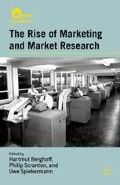Abstract
On February 20, 1899, one could read in the Deutsche Export-Zeitung the following story. A firm from Coburg specializing in basketwork had written to the paper to inquire about exporting its products to East India. The journal then made its own inquiries with the federal Ministry of the Interior, the Berlin Chamber of Commerce, and the Association of Berlin Manufacturers and Merchants. No answer came from the ministry, and the chamber of commerce explained that answering such queries was not part of its mission. The professional association was a bit more helpful and provided some statistics about German basketwork exports to East India in 1896 and 1897. The numbers, however, were quite discouraging, as was the accompanying comment: only the most sophisticated products had a chance, and even these kinds of exports were rapidly vanishing.
Access this chapter
Tax calculation will be finalised at checkout
Purchases are for personal use only
Preview
Unable to display preview. Download preview PDF.
Notes
Steven Conn, Museums and American Intellectual Life (Chicago, IL, 1998), chap. 4;
Hans-Peter Ullmann, “Staatliche Exportförderung und private Exportinitiative: Probleme des Staatsinterventionismus im Deutschen Kaiserreichs am Beispiel der staatlichen Aussenhandelsförderung (1880–1919),” Vierteljahrsschrift für Sozial- und Wirtschaftsgeschichte 65, no. 2 (1978): 157–216; Colette Zytnicki, “Mercure au Musée: L’exemple du Musée colonial de Bordeaux, 1901–1937,” Outre-Mers: Revue d’ histoire, nos. 356–357 (2007): 111–23;
Christophe Bouneau and Philippe Lacombrade, “Préoccupations internationales et action locale (1890–1914),” in La Chambre de Commerce et d’Industrie de Paris, 1803–2003: Histoire d’une institution (Geneva, 2003), 131–76.
Egbert Klautke, Unbegrenzte Möglichkeiten: “Amerikanisierung” in Deutschland und Frankreich, 1900–1933 (Stuttgart, 2003).
Seija-Riitta Laakso, Across the Oceans: Development of Overseas Business Information Transmission, 1815–1875 (Helsinki, 2007).
See Léonard Laborie, “Mondialisation postale: Territoires et innovations tarifaires dans la seconde moitié du XIXe siècle,” Histoire, Economie et Société 2 (2007): 15–27.
Christian Topalov, ed., Laboratoires du nouveau siècle: La nébuleuse réformatrice et ses réseaux en France, 1880–1914 (Paris, 1999);
Janet Horne, Le musée social: Aux origines de l’Etat providence (Paris, 2004).
Deborah L. Silverman, Art Nouveau in fin-de-siècle France: Politics, Psychology, and Style (Berkeley, CA, 1989).
This was no exception. For example, a museum was created inside the Ecole supérieure de commerce et d’industrie of Bordeaux in 1877. There could be found 7,000 samples of colonial products, mainly those of significance for local business. See Albert Mengeot, De la création à Bordeaux d’un musée commercial et colonial, musées étrangers et français, offices de renseignements, organisation d’un bureau régional d’information (Bordeaux, 1900).
Auguste Deleuil, Annuaire des musées commerciaux français à l’étranger (Paris, 1887);
F. des Tournelles, Les Musées commerciaux à l’étranger: Rapport de mission présenté à M. Le sous-secrétaire d’Etat aux colonies (Paris, 1888);
Gaston Cadoux, L’influence française à l’étranger: Notre commerce d’exportation et nos consuls (Paris, 1889);
Cadoux, Les attachés commerciaux et les consulats: Rapport à M. le Ministre des Affaires etrangères à la suite d’un voyage d’études en Suisse, en Allemagne et en Autriche-Hongrie (Paris, 1891);
Paul Vibert, La concurrence étrangère: Les musées commerciaux et l’Exposition universelle de 1889 (Paris, 1892);
Paul Raché, Was tut Deutschland für seinen Aussenhandel? (Berlin, 1899);
Max Vosberg-Rekow, Die Errichtung einer Centralsstelle zur Förderung des deutschen Aussenhandels (Berlin, 1900);
Wilhelm Wendlandt, Handels-Auskunftsstellen des Auslandes (Berlin, 1900);
Max Gätcke, Das kaufmännische Auskunftswesen in den Vereinigten Staaten und in Grossbritannien (Berlin, 1901);
Abraham Neufeld, Die führenden Nationalämter: Ein Beitrag zur Frage der Errichtung einer Reichshandelsstelle (Berlin, 1903); Die Organisation des Exports, special issue of an article series from Deutsche Export-Revue (Stuttgart, 1904);
Handwörterbuch der Staatswissenschaften, ed. Johannes Conrad et al., 3rd ed., vol. 3 (Berlin, 1909), s.vv. “Exportmusterlager” and “Handelsmuseum”;
O. Piequet, V. Baehr, Rapport sur les musées commerciaux en Allemagne (Rouen, 1909);
Aimé Serre, L’Office national du commerce extérieur: Historique-fonctionnement (Paris, 1927).
Emile Monod, Les musées commerciaux: Leur organisation et leur fonctionnement (Paris, 1887). For Germany, the author listed Berlin, Karlsruhe, Dresden, Düsseldorf, Frankfurt am Main, Munich, and Stuttgart, though this country, like France, had no national commercial museum at the time.
Rowena Olegario, A Culture of Credit: Embedding Trust and Transparency in American Business (Cambridge, MA, 2006);
Hartmut Berghoff, “Civilizing Capitalism? The Beginnings of Credit Rating in the United States and Germany,” Bulletin of the German Historical Institute 45 (Fall 2009): 9–28.
R. Loriot, Des agences de renseignements commerciaux et de leur responsabilité (Paris, 1907).
Madeleine Barbier Decrozes, Du Protectionnisme à la mondialisation, 1898–1998: Histoire des conseillers du commerce extérieur de la France (Paris, 1999);
Laurence Badel, “Pour une histoire de la diplomatie économique de la France,” Vingtième Siècle: Revue d’histoire 90, no. 2 (2006): 169–85.
See Daniel T. Rodgers, Atlantic Crossings: Social Politics in a Progressive Age (Cambridge, MA, 1998);
Pierre-Yves Saunier, “Circulations, connexions et espaces transnationaux,” Genèses 57 (2004): 110–26.
Wilhelm Wendlandt, Die Förderung des Aussenhandels (Halle, 1903).
Arthur Raffalovitch, L’Etat et les renseignements commerciaux (Paris, 1899).
Staatssekretär von Schön used this idea during debates in the Reichstag about the consular reports of 1909 and 1910. B. v. König, “Die Konsularische Berichterstattung und der amtliche Nachrichtendienst,” Bank-Archiv 10 (1911): 291–95, 313–16, 331–34, 343–48.
Joh. H. Boeck, Der Exportbetrieb (Heidelberg, 1908).
Séverine Antigone Marin, “L’espion américain, un fantasme de l’industrie allemande vers 1900,” Revue d’Allemagne 41, no. 1 (2009): 19–39.
Paul Behm, Der Handelsagent: Seine soziale Stellung und volkswirtschaftliche Bedeutung (Berlin, 1913).
See Marie-Emmanuelle Chessel, La publicité: Naissance d’une profession: 1900–1940 (Paris, 1998);
Walter A. Friedman, Birth of a Salesman: The Transformation of Selling in America (Cambridge, MA, 2004).
Editor information
Editors and Affiliations
Copyright information
© 2012 The German Historical Institute
About this chapter
Cite this chapter
Marin, S.A. (2012). Introducing Small Firms to International Markets: The Debates over the Commercial Museums in France and Germany, 1880–1910. In: Berghoff, H., Scranton, P., Spiekermann, U. (eds) The Rise of Marketing and Market Research. Worlds of Consumption. Palgrave Macmillan, New York. https://doi.org/10.1057/9781137071286_6
Download citation
DOI: https://doi.org/10.1057/9781137071286_6
Publisher Name: Palgrave Macmillan, New York
Print ISBN: 978-1-349-34388-1
Online ISBN: 978-1-137-07128-6
eBook Packages: Palgrave History CollectionHistory (R0)

